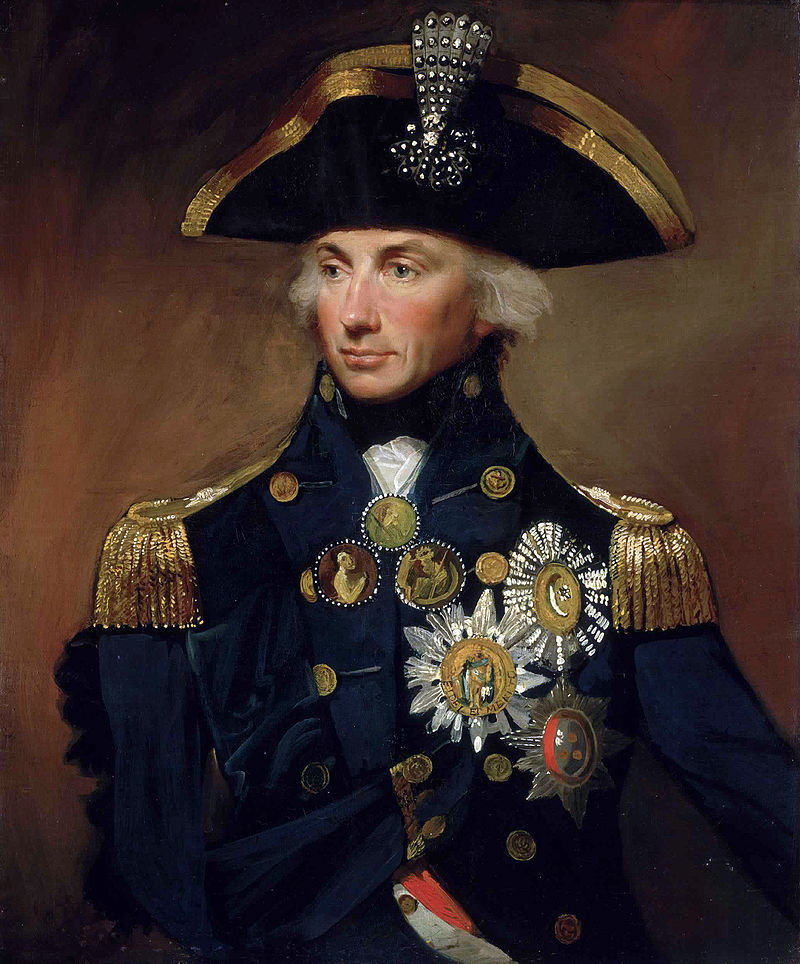terça-feira, outubro 21, 2025
O Almirante Nelson morreu há duzentos e vinte anos...
Postado por Fernando Martins às 00:22 0 comentários
Marcadores: Almirante Nelson, Batalha de Trafalgar, guerras napoleónicas, Horatio Nelson, Lord Nelson
segunda-feira, outubro 21, 2024
O Almirante Nelson morreu há 219 anos...
Postado por Fernando Martins às 02:19 0 comentários
Marcadores: Almirante Nelson, Batalha de Trafalgar, guerras napoleónicas, Horatio Nelson, Lord Nelson
sábado, outubro 21, 2023
O Almirante Nelson morreu há 218 anos
Postado por Fernando Martins às 02:18 0 comentários
Marcadores: Almirante Nelson, Batalha de Trafalgar, guerras napoleónicas, Horatio Nelson, Lord Nelson
sexta-feira, outubro 21, 2022
O Almirante Nelson morreu há 217 anos
Postado por Fernando Martins às 02:17 0 comentários
Marcadores: Almirante Nelson, Batalha de Trafalgar, guerras napoleónicas, Horatio Nelson, Lord Nelson
quinta-feira, outubro 21, 2021
O Almirante Nelson morreu há 216 anos
Postado por Fernando Martins às 02:16 0 comentários
Marcadores: Almirante Nelson, Batalha de Trafalgar, guerras napoleónicas, Horatio Nelson, Lord Nelson
quarta-feira, outubro 21, 2020
Nelson, o herói de Trafalgar, morreu há 215 anos
(...)
A Batalha
A batalha progrediu em grande parte de acordo com o plano de Nelson. Às 11.45, Nelson enviou o famoso sinal de bandeira: England expects that every man will do his duty ("A Inglaterra espera que cada homem cumpra com o seu dever").
Tudo ocorreu perfeitamente para os ingleses, com vários barcos inimigos afundados ou capturados, graças à perícia dos marinheiros ingleses no manuseamento dos canhões. No entanto, Nelson morreu na batalha, atingido por uma bala de mosquete das velas de gávea do francês Redoutable que, no momento, varria o Victory de popa a proa. O navio de Nelson perdeu 57 homens, incluindo o próprio comandante, e teve 102 feridos. O Redoutable, em contraste, teve 22 de seus 64 canhões desmontados e, de uma tripulação de 643, houve 487 mortos e 81 feridos. Esse enorme índice de baixas francesas é um reflexo da eficácia da artilharia inglesa. Quem assumiu o comando da frota inglesa foi o vice-almirante Cuthbert Collingwood, do navio capitão Royal Sovereign. Após a batalha, uma tempestade alcançou a frota inglesa, que acabou por perder grande parte dos navios recém conquistados, já muito destroçados.
in Wikipédia
Postado por Fernando Martins às 02:15 0 comentários
Marcadores: Almirante Nelson, Batalha de Trafalgar, guerras napoleónicas, Horatio Nelson, Lord Nelson
quarta-feira, outubro 21, 2015
Nelson,o herói de Trafalgar, morreu há 210 anos
Postado por Fernando Martins às 23:21 0 comentários
Marcadores: Almirante Nelson, Batalha de Trafalgar, Horatio Nelson, Lord Nelson
A Batalha de Trafalgar foi há 210 anos!
(...)
A Batalha
A batalha progrediu em grande parte de acordo com o plano de Nelson. Às 11.45, Nelson enviou o famoso sinal de bandeira: England expects that every man will do his duty ("A Inglaterra espera que cada homem cumpra com o seu dever").
Tudo ocorreu perfeitamente para os ingleses, com vários barcos inimigos afundados ou capturados, graças à perícia dos marinheiros ingleses no manuseamento dos canhões. No entanto, Nelson morreu na batalha, atingido por uma bala de mosquete das velas de gávea do francês Redoutable que, no momento, varria o Victory de popa a proa. O navio de Nelson perdeu 57 homens, incluindo o próprio comandante, e teve 102 feridos. O Redoutable, em contraste, teve 22 de seus 64 canhões desmontados e, de uma tripulação de 643, houve 487 mortos e 81 feridos. Esse enorme índice de baixas francesas é um reflexo da eficácia da artilharia inglesa. Quem assumiu o comando da frota inglesa foi o vice-almirante Cuthbert Collingwood, do navio capitão Royal Sovereign. Após a batalha, uma tempestade alcançou a frota inglesa, que acaboupor perder grande parte dos navios recém conquistados, já muito destroçados.
| Data: | 21 de outubro de 1805 | ||
| Local: | Ao largo do cabo Trafalgar, no sul da Espanha, perto do estreito de Gibraltar | ||
| Desfecho: | Vitória decisiva do Reino Unido | ||
| Combatentes | |||
|---|---|---|---|
| Comandantes | |||
| |||
| Forças | |||
| |||
| Baixas | |||
| |||
Postado por Fernando Martins às 21:00 0 comentários
Marcadores: Almirante Nelson, Batalha de Trafalgar, guerras napoleónicas, Horatio Nelson, Lord Nelson







